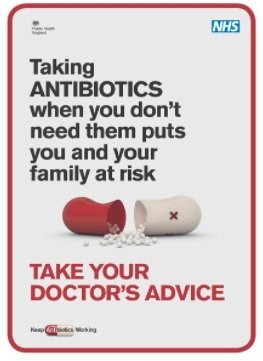Diagnostic tests can help ‘Keep Antibiotics Working’
24 Oct 2017
Written by Caroline Purslow
Yesterday, Public Health England (PHE) launched the first national campaign to address antimicrobial resistance (AMR), called ‘Keep Antibiotics Working’. Television adverts colourfully ask the public through song and dancing pills to ‘take their doctor’s advice’ and not request antibiotics.
This campaign was commissioned partially in response to the call-to-action published in the Review on Antimicrobial Resistance by Jim O’Neill, which highlighted the need for a global public awareness campaign on antibiotic resistance.
“10 million people will die globally each year from drug-resistant infections by the year 2050, should successful interventions not be put in place. This accounts for more than deaths associated with both cancer and diabetes combined.”

One key intervention to prevent antimicrobial resistance, is to reduce the inappropriate prescribing of antibiotics. Financial incentives in both primary and secondary care have had a significant impact on current prescribing levels in England. According to the ESPAUR report:
- The number of prescriptions dispensed in GP settings decreased by 12% between 2012 and 2016, however there was little decrease in hospital settings
- Dispensing for both carbapenems and piperacillin-tazobactam, which are both last-line antibiotics vital in combating resistant infections, decreased approximately 4% between 2015 and 2016.
Despite the reductions recorded in antimicrobial prescribing, rates of particular hospital-acquired infections continue to rise. With successful interventions to reduce MRSA and C. difficile, the UK government’s focus has moved to tackling Gram-negative, healthcare-acquired infections, notably E. coli, Klebsiella and Pseudomonas.
Moving forward, the government is looking to reduce inappropriate prescribing by 50% by 2020/21 and to reduce Gram-negative, healthcare-associated bloodstream infections by 50% in the same timescale. Multiple interventions will be required to fulfill these ambitions including increased infection prevention and control, surveillance and prescribing reduction targets.

What does the Longitude Prize have to contribute?
Alongside these ambitions on reducing prescribing and infection rates, is the call that in all developed countries by 2020 “prescriptions of antibiotics will need to be informed by data and testing technology wherever available and effective in informing the doctor’s judgement to prescribe”.
The use of a diagnostic test at the point of care can help reduce prescriptions of unnecessary antibiotics, for example, to tell us when a viral or bacterial infection is present, or to avoid prescribing an antibiotic when the bacteria causing the infection are resistant.
“It is hoped that in awarding this prize, we can significantly impact on the rising trajectory of antibiotic resistance and help keep antibiotics working.”
The ESPAUR report demonstrates the need for such specificity in prescribing, highlighting, for example, that 41% of E. coli, the most common cause of bloodstream infections, were resistant to the most common antibiotic used to treat infections in hospitals, co-amoxiclav.
The Longitude Prize seeks to award prize money to a company, research team or individual who are able to invent an affordable, accurate, fast and easy-to-use test for bacterial infections that will allow health professionals worldwide to administer the right antibiotics at the right time, as detailed in our Prize Rules. It is hoped that in awarding this Prize, we can significantly impact on the rising trajectory of antibiotic resistance and help keep antibiotics working.
